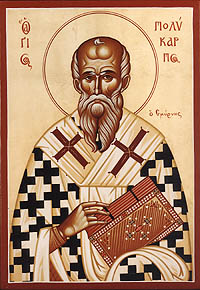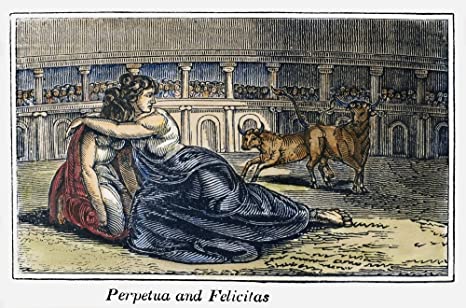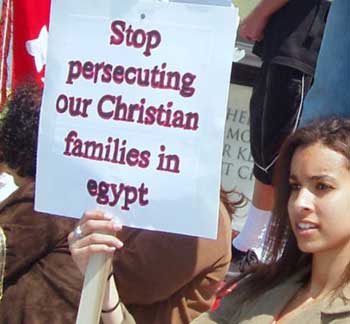Persecutions
 The persecution of Christians was a constant threat for the ante-Nicene Church. It was not, however, a constant reality: in fact, far from it. Except for two important persecutions — one under the Emperor Decius in 249–251, and "the Great Persecution" of 303–311 — persecution was not consistent, widespread, systematic, or prolonged reality. It was, however, an ever-present risk, which could be triggered locally by an informant or a zealous Roman administrator. Every Christian had to have some awareness that his or her commitment to Christ might prove very costly, at least as the world understands costliness. This ever-present risk influenced Christian organization, worship, daily life, spirituality, community formation, and doctrine.
The persecution of Christians was a constant threat for the ante-Nicene Church. It was not, however, a constant reality: in fact, far from it. Except for two important persecutions — one under the Emperor Decius in 249–251, and "the Great Persecution" of 303–311 — persecution was not consistent, widespread, systematic, or prolonged reality. It was, however, an ever-present risk, which could be triggered locally by an informant or a zealous Roman administrator. Every Christian had to have some awareness that his or her commitment to Christ might prove very costly, at least as the world understands costliness. This ever-present risk influenced Christian organization, worship, daily life, spirituality, community formation, and doctrine.
Accordingly, I think that González has reasonable justification for beginning narrative of early Christianity (after he finished with the New Testament period) by talking about conflicts between Church and state.
Most of us will have three big questions when we read this chapter. First, why did the world persecute Christians? Second, how did Christians understand persecution? And, third, how would we ourselves respond if we were faced with persecution? (The lecture notes linked at the left will help answer the first and the second questions. The third question I'll leave to you.)
Perpetua
Probably in 202 or 203, a young Christian woman with an infant child, and a number of her companions, were martyred in Carthage. Anglicans commemorate them on March 7, in the calendar of the Book of Alternative Services.
 The first tutorial reading assigned for our course is the narrative of an unidentified ancient editor, who includes generous portions of the ancient diary of Perpetua, and part of the record of her companion Saturus. This is a remarkably accessible document which easily spans the centuries. But it also portrays Christianity in a way we're probably not used to. It can raise some personal questions about faithfulness and life in the Spirit.
The first tutorial reading assigned for our course is the narrative of an unidentified ancient editor, who includes generous portions of the ancient diary of Perpetua, and part of the record of her companion Saturus. This is a remarkably accessible document which easily spans the centuries. But it also portrays Christianity in a way we're probably not used to. It can raise some personal questions about faithfulness and life in the Spirit.
Consequences of the persecutions
The persecutions of Christians in the Roman Empire during the first three centuries after Christ had several consequences:They may have assisted church growth. "The blood of the martyrs is seed," said Tertullian. It tested individual commitment, rallied Christian communities around their persecuted brothers and sisters, and raised the public profile of the movement. They helped generate a sense among Christians in their formative period that affliction was a norm of discipleship. They helped establish a tradition within Christianity of suspicion of state power. They promoted organizational development. Communities without durable and resilient structures were likely to cave in during persecutions. They created at least two classes of Christians, those who were willing to endure persecution and those who weren't; this later led to disagreements, and sometimes schisms, about whether to re-admit the waverers to full communion.
Persecution today
One reason for studying persecution in the early Church is that it helps you understand the early Church. But another reason is that it may help you make some sense of the worldwide Church today. We don't face persecution in Canada. But millions of Christians around the world are facing persecution as you read this.
Dr. Paul Marshall, formerly the academic dean of the Institute of Christian Studies in Toronto (an affiliate of the Toronto School of Theology), has taken a prominent part in inventorying cases of the persecution of Christians and bringing them to public attention. His book Their Blood Cries Out (1997) is still an imortant primer on the subject.
In response to the exposés of Marshall and others, the U.S. Congress in 1998 passed the International Religious Freedom Act, which provides that the Secretary of State must submit a detailed annual report on persecution. These reports continue to be published annually. See the link to the left.
In April 2011, Prime Minister Stephen Harper began to establish an Office of Religious Freedom within the Canadian  government, to ensure that the defence of persecuted religious minorities would be a part of the country's foreign policy. This office was opened in 2013, headed by Dr. Andrew P.W. Bennett, formerly the dean of Augustine College, a Christian school in Ottawa. The new Liberal government closed it in March 2016, despite support for it from Jewish, Sikh, and Muslim constituencies. Some leaders in the Conservative Party say they would like to restore it.
government, to ensure that the defence of persecuted religious minorities would be a part of the country's foreign policy. This office was opened in 2013, headed by Dr. Andrew P.W. Bennett, formerly the dean of Augustine College, a Christian school in Ottawa. The new Liberal government closed it in March 2016, despite support for it from Jewish, Sikh, and Muslim constituencies. Some leaders in the Conservative Party say they would like to restore it.
About 1.5 million Sudanese Christians perished at the hands of the Janjaweed, the Arab Muslim militia, between 1989 and 2005, when an armistice was signed. In 2011 South Sudan, where most Sudanese Christians livedd, seceded from Sudan, and endorsed a Muslim constitution. Dozens of churches have been destroyed. Ethnic as well as religious differences are involved. Here's a 2017 article in The Economist on the situation. Talisman Energy of Calgary (formerly BP Canada) did business in Sudan until March 2003, and was unsuccessfully sued in U.S. courts by the Presbyterian Church of Sudan for aiding in genocide through its financial and logistical aid to the Sudanese government. Lloyd Axworthy, Canada's foreign affairs minister during the 1990s, recalls in this 2015 interview his discouragement with Talisman's contribution to the violence of Sudan. Talisman was taken over by Repsol Oil and Gas in 2015.
A Canadian Catholic digital journal called Convivium published this article on Canada's complicity in Christian cleansing in the Middle East.
]